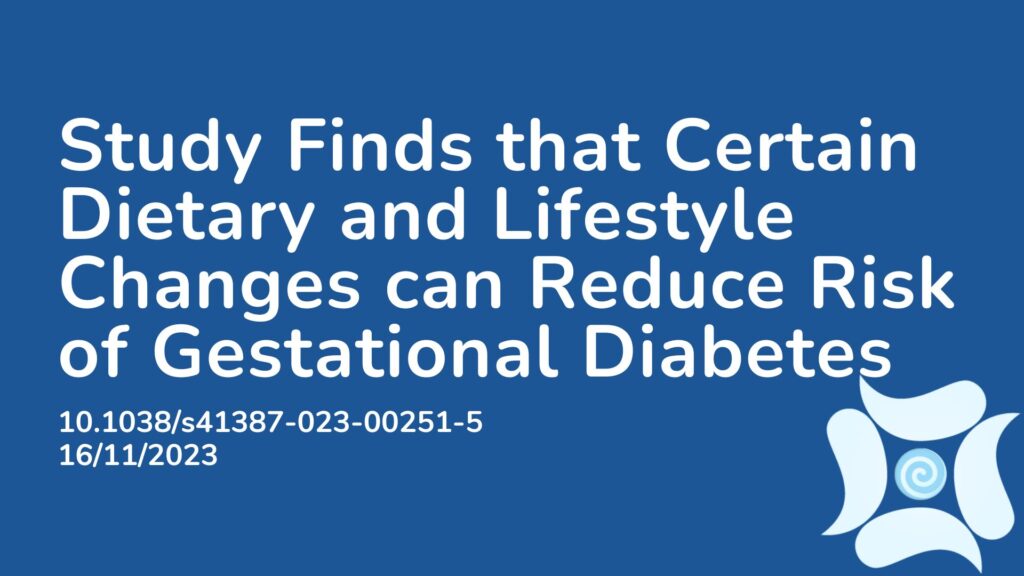Summary:
Gestational diabetes mellitus (GDM) is characterized by high blood sugar levels (hyperglycemia) first detected at any point during pregnancy. GDM may cause adverse effects on the fetus before GDM diagnosis, so early diagnosis is critical. The current management approach focuses mainly on diagnosis and treatment, and has not yet shifted to advice on whether it can be prevented. Lifestyle interventions have proven effective in preventing type-2 diabetes, suggesting their potential in preventing GDM. However, studies evaluating the impact of lifestyle interventions during pregnancy on GDM is inconsistent. The goal of this study was to summarize evidence from 30 studies encompassing 257,876 pregnancies looking at pre-pregnancy lifestyles and risk of GDM. The paper concluded that specific elements of pre-pregnancy lifestyle interventions such as counselling, increased vegetable and fruit intake, adherence to a low carbohydrate/low sugar diet and elevated physical activity, can mitigate the risk of developing GDM. However, the evidence from randomized-controlled trials (RCTs) was limited, and the number of studies conducted in low- and middle-income countries was also insufficient. This emphasizes the necessity for well-designed RCTs that integrate various aspects of lifestyle interventions to properly understand whether GDM can be prevented.
Abstract:
Background: Gestational Diabetes Mellitus (GDM) is hyperglycaemia first detected during pregnancy. Globally, GDM affects around 1 in 6 live births (up to 1 in 4 in low- and middle-income countries- LMICs), thus, urgent measures are needed to prevent this public health threat. Objective: To determine the effectiveness of pre-pregnancy lifestyle in preventing GDM. Methods: We searched MEDLINE, Web of science, Embase and Cochrane central register of controlled trials. Randomized control trials (RCTs), case-control studies, and cohort studies that assessed the effect of pre-pregnancy lifestyle (diet and/or physical activity based) in preventing GDM were included. Random effects model was used to calculate odds ratio (OR) with 95% confidence interval. The Cochrane ROB-2 and the Newcastle-Ottawa Scale were used for assessing the risk of bias. The protocol was registered in PROSPERO (ID: CRD42020189574). Results: Database search identified 7935 studies, of which 30 studies with 257,876 pregnancies were included. Meta-analysis of the RCTs (N = 5; n = 2471) in women who received pre-pregnancy lifestyle intervention showed non-significant reduction of the risk of developing GDM (OR 0.76, 95% CI: 0.50–1.17, p = 0.21). Meta-analysis of cohort studies showed that women who were physically active pre-pregnancy (N = 4; n = 23263), those who followed a low carbohydrate/low sugar diet (N = 4; n = 25739) and those women with higher quality diet scores were 29%, 14% and 28% less likely to develop GDM respectively (OR 0.71, 95% CI: 0.57, 0.88, p = 0.002, OR 0.86, 95% CI: 0.68, 1.09, p = 0.22 and OR 0.72, 95% CI 0.60–0.87, p = 0.0006). Conclusion: This study highlights that some components of pre-pregnancy lifestyle interventions/exposures such as diet/physical activity-based preparation/counseling, intake of vegetables, fruits, low carbohydrate/low sugar diet, higher quality diet scores and high physical activity can reduce the risk of developing gestational diabetes. Evidence from RCTs globally and the number of studies in LMICs are limited, highlighting the need for carefully designed RCTs that combine the different aspects of the lifestyle and are personalized to achieve better clinical and cost effectiveness.
Article Publication Date: 16/11/2023
DOI: 10.1038/s41387-023-00251-5




